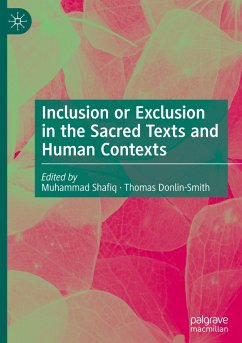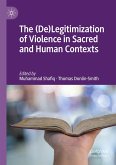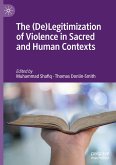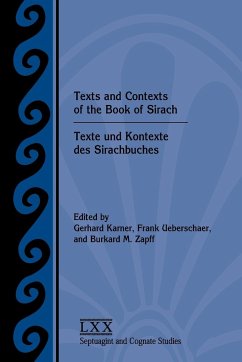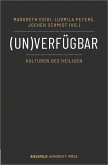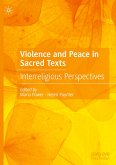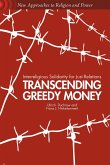Inclusion or Exclusion in the Sacred Texts and Human Contexts
Herausgegeben:Shafiq, Muhammad; Donlin-Smith, Thomas
Inclusion or Exclusion in the Sacred Texts and Human Contexts
Herausgegeben:Shafiq, Muhammad; Donlin-Smith, Thomas
- Gebundenes Buch
- Merkliste
- Auf die Merkliste
- Bewerten Bewerten
- Teilen
- Produkt teilen
- Produkterinnerung
- Produkterinnerung
This work delves into the fundamental issue of Otherness, from both sacred texts and communal experiences. While the title adopts the dyad of "inclusion" or "exclusion", these analyses broadly reflect nuanced critical considerations. Filled with profound psychological, theological, sociological, anthropological, and ethical dimensions, experiencing the Other is richly expressed within religious traditions. This book is a must for scholars interested in a multi-disciplinary approach to inclusivity and religion.
Andere Kunden interessierten sich auch für
![The (De)Legitimization of Violence in Sacred and Human Contexts The (De)Legitimization of Violence in Sacred and Human Contexts]() The (De)Legitimization of Violence in Sacred and Human Contexts149,79 €
The (De)Legitimization of Violence in Sacred and Human Contexts149,79 €![The (De)Legitimization of Violence in Sacred and Human Contexts The (De)Legitimization of Violence in Sacred and Human Contexts]() The (De)Legitimization of Violence in Sacred and Human Contexts104,99 €
The (De)Legitimization of Violence in Sacred and Human Contexts104,99 €![Texts and Contexts of the Book of Sirach / Texte und Kontexte des Sirachbuches Texts and Contexts of the Book of Sirach / Texte und Kontexte des Sirachbuches]() Texts and Contexts of the Book of Sirach / Texte und Kontexte des Sirachbuches46,99 €
Texts and Contexts of the Book of Sirach / Texte und Kontexte des Sirachbuches46,99 €![(Un)verfügbar - Kulturen des Heiligen (Un)verfügbar - Kulturen des Heiligen]() (Un)verfügbar - Kulturen des Heiligen39,00 €
(Un)verfügbar - Kulturen des Heiligen39,00 €![Diakonie zwischen Inklusion und Exklusion Diakonie zwischen Inklusion und Exklusion]() Diakonie zwischen Inklusion und Exklusion49,00 €
Diakonie zwischen Inklusion und Exklusion49,00 €![Violence and Peace in Sacred Texts Violence and Peace in Sacred Texts]() Violence and Peace in Sacred Texts112,99 €
Violence and Peace in Sacred Texts112,99 €![Transcending Greedy Money Transcending Greedy Money]() Ulrich DuchrowTranscending Greedy Money40,99 €
Ulrich DuchrowTranscending Greedy Money40,99 €-
-
-
This work delves into the fundamental issue of Otherness, from both sacred texts and communal experiences. While the title adopts the dyad of "inclusion" or "exclusion", these analyses broadly reflect nuanced critical considerations. Filled with profound psychological, theological, sociological, anthropological, and ethical dimensions, experiencing the Other is richly expressed within religious traditions. This book is a must for scholars interested in a multi-disciplinary approach to inclusivity and religion.
Produktdetails
- Produktdetails
- Verlag: Palgrave Macmillan / Springer Nature Switzerland / Springer, Berlin
- Artikelnr. des Verlages: 978-3-031-70179-5
- Seitenzahl: 272
- Erscheinungstermin: 26. Oktober 2024
- Englisch
- Abmessung: 216mm x 153mm x 20mm
- Gewicht: 445g
- ISBN-13: 9783031701795
- ISBN-10: 3031701798
- Artikelnr.: 71253539
- Herstellerkennzeichnung Die Herstellerinformationen sind derzeit nicht verfügbar.
- Verlag: Palgrave Macmillan / Springer Nature Switzerland / Springer, Berlin
- Artikelnr. des Verlages: 978-3-031-70179-5
- Seitenzahl: 272
- Erscheinungstermin: 26. Oktober 2024
- Englisch
- Abmessung: 216mm x 153mm x 20mm
- Gewicht: 445g
- ISBN-13: 9783031701795
- ISBN-10: 3031701798
- Artikelnr.: 71253539
- Herstellerkennzeichnung Die Herstellerinformationen sind derzeit nicht verfügbar.
Muhammad Shafiq, professor of religious studies at Nazareth University, directs the Hickey Center for Interfaith Studies, holds the IIIT Chair for Islamic and Interfaith Studies. He teaches Islam, interfaith studies, comparative religion. He received his M.A./Ph.D./Fulbright Fellowship from Temple University. His research has culminated in 50+ articles, nine books and multiple national/international conferences. Thomas Donlin-Smith, professor of religious studies at Nazareth University, teaches comparative and biomedical ethics, religion and politics. His research analyzes religious ethics, science, and politics. He is an advisory board of the Hickey Center and serves on institutional research ethics committees. He received his M.Div. from Wesley Theological Seminary, and Ph.D. from the University of Virginia.
Part I. Inclusion or Exclusion in the Sacred Texts Traditions.- Chapter 1. A Framework for Inclusion and Exclusion in Jewish Law and Practice.- Chapter 2. Does EVERYONE get to ride the "Great Vehicle"?-Exclusive Inclusivism in the Lotus Sutra.- Chapter 3. Inclusive Evangelicalism? Towards an Ontology of Inclusion in Evangelical Christian Traditions.- Chapter 4. Revisiting Madinah Pact: Towards Rebuilding an Ideal Inclusive Society.- Chapter 5. Confucian Exclusivism: A Challenge to Confucian Exemplarist Morality.- Part II. Comparative Studies of Inclusion or Exclusion in Religious Traditions.- Chapter 6. Legitimating the Other's Wisdom for Common Cause: Rev. Dr. Martin Luther King's Palm Sunday: Sermon on Mohandas K. Gandhi.- Chapter 7. Encountering God's Grace in Islam: A Christian Reading of the Forty Hadith of Nawawi.- Chapter 8. From Exodus to Hizmet: Redefining Other and Self in Thought and Action.- Chapter 9. All Lovers are Welcome: Rumi and the Spirituality of Hospitality in Fihi ma fihi.- Part III. Contemporary Approaches to Inclusion or Exclusion in Religious Traditions.- Chapter 10. Search for Belongingness: A Social Rhetorical Reading on Migration in the Bible.- Chapter 11. Al-Wala' Wa-Al-Bara': The Principle of Loyalty to Muslims and Disavowal of Non-Muslims. Theorized by Ibn Taymiyya, Adopted and Developed by Early Wahhabism.- Chapter 12. Multiple Political Discourses in the Islamic Tradition.- Chapter 13. The Hateful Rhetoric against Muslims and the Authority-making of Islamic Identity.- Chapter 14. Religious Identity in a Pluralistic Age: The Paradox of Being Simultaneously Rooted and Open.
Part I. Inclusion or Exclusion in the Sacred Texts Traditions.- Chapter 1. A Framework for Inclusion and Exclusion in Jewish Law and Practice.- Chapter 2. Does EVERYONE get to ride the "Great Vehicle"?-Exclusive Inclusivism in the Lotus Sutra.- Chapter 3. Inclusive Evangelicalism? Towards an Ontology of Inclusion in Evangelical Christian Traditions.- Chapter 4. Revisiting Madinah Pact: Towards Rebuilding an Ideal Inclusive Society.- Chapter 5. Confucian Exclusivism: A Challenge to Confucian Exemplarist Morality.- Part II. Comparative Studies of Inclusion or Exclusion in Religious Traditions.- Chapter 6. Legitimating the Other's Wisdom for Common Cause: Rev. Dr. Martin Luther King's Palm Sunday: Sermon on Mohandas K. Gandhi.- Chapter 7. Encountering God's Grace in Islam: A Christian Reading of the Forty Hadith of Nawawi.- Chapter 8. From Exodus to Hizmet: Redefining Other and Self in Thought and Action.- Chapter 9. All Lovers are Welcome: Rumi and the Spirituality of Hospitality in Fihi ma fihi.- Part III. Contemporary Approaches to Inclusion or Exclusion in Religious Traditions.- Chapter 10. Search for Belongingness: A Social Rhetorical Reading on Migration in the Bible.- Chapter 11. Al-Wala' Wa-Al-Bara': The Principle of Loyalty to Muslims and Disavowal of Non-Muslims. Theorized by Ibn Taymiyya, Adopted and Developed by Early Wahhabism.- Chapter 12. Multiple Political Discourses in the Islamic Tradition.- Chapter 13. The Hateful Rhetoric against Muslims and the Authority-making of Islamic Identity.- Chapter 14. Religious Identity in a Pluralistic Age: The Paradox of Being Simultaneously Rooted and Open.

